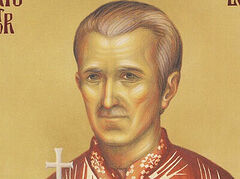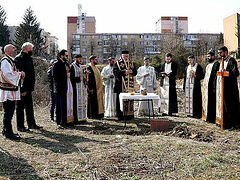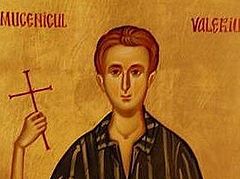In 2025, by decision of the Holy Synod of the Romanian Orthodox Church, several ascetics of piety will be glorified among the saints. Our readers are already familiar with a number of them, including Archimandrite Cleopa (Ilie), Hieroschemamonk Paisie (Olaru), and Hieromonk Dionisie (Ignat). We would also like to acquaint you with another of these soon-to-be-canonized ascetics—Archimandrite Gherasim (Iscu).
Fr. Gherasim (Iscu) was born on January 21, 1912, in the village of Poduri, Bacău County, in a family of faithful peasants, Grigore and Elena, receiving his father’s name in Holy Baptism. In 1924, at the age of twelve, he entered Bogdan Monastery in the same Bacău County as a novice. From 1925 to 1928, he studied at the monastic seminary at Neamț Monastery, and after it was dissolved, he continued his studies at the Prince Ferdinand Lyceum in Bacău. In 1932, he entered Tismana Monastery and took monastic vows with the name Gherasim. He began studying at the seminary at Cernica Monastery at the same time, from which he graduated in 1935 as valedictorian. Then he went to study at the Theological Faculty of the University of Bucharest, from which he graduated in 1942.
Monastic and teaching mission in Muntenia, Oltenia, and Transnistria
 The brotherhood of Tismana Monastery, July 12, 1936. Monk Gherasim (Iscu) is fourth from the left in the second row
The brotherhood of Tismana Monastery, July 12, 1936. Monk Gherasim (Iscu) is fourth from the left in the second row
Fr. Gherasim was ordained a hieromonk on April 1, 1936, at Tismana Monastery. From 1937 to 1939, he was appointed abbot of Arnota Monastery, which he restored after a fire. In 1939, he was sent to Cernica Monastery as the librarian and accountant of the monastic seminary. On April 1, 1942, Metropolitan Nifon (Criveanu) of Oltenia and Transnistria sent him to do missionary work. There he erected churches and served as a priest and a teacher of religion. In May 1943, he returned home, where he was named abbot of Tismana Monastery and appointed exarch of the monasteries of the Archdiocese of Craiovei, being elevated to the rank of protosinghel. He restored Tismana Monastery, which had suffered greatly after it was turned into a prison for Legionnaires.
Sentenced to ten years of hard labor
After the establishment of the communist regime, Abbot Fr. Gherasim offered several members of the National Resistance Movement food and shelter in his monastery, helping in this way those who were forced to flee. For this collaboration, he was arrested on September 26, 1948, for “a crime in the form of conspiracy against the social order” and was sentenced to ten years of hard labor.
Fr. Constantin Hodoroagă testifies to Fr. Gherasim’s steadfastness during his interrogations:
The Abbot’s stance amazed everyone. He endured all the tortures without betraying anyone involved in the case. After a long interrogation by the security authorities, the captain, tired of beating him, told him: “You’re crazy. Everyone else has already confessed, and you’re going to be sentenced to fifteen years too.”
Fr. Gherasim went through a number of communist prisons, enduring beatings and endless humiliation in the penitentiaries of Craiovei, Pitești, Gherla, and Aiud, and in the Danube-Black Sea Canal correctional labor camp, and finally, having fallen seriously ill with tuberculosis, he was transferred to the prison hospital at Târgu Ocna.
“He practiced the prayer of the heart and possessed great spiritual resources”
During his imprisonment, Fr. Gherasim strengthened the hearts of the prisoners through the firmness of his faith, taught them to pray, and together with other political prisoners, formed a spiritual movement of resistance to the atheistic assault preached by the communist butchers.
In his book Return to Christ, Ioan Ianolide recalls Fr. Gherasim’s preaching of the love of Christ in the torture chambers of the communist prisons:
He was thin as a shadow. He labored at the Danube-Black Sea Canal, where he worked sixteen hours a day, after which he had four more hours of administrative work. He was assigned to a special brigade for priests intended for accelerated extermination. Fr. Gherasim encouraged his friends at the Canal, helped many with their work, and was always open to everyone as a priest.
He practiced the prayer of the heart and possessed great spiritual resources, thanks to which he overcame all hardships. But snitches informed on him several times, that he was hearing confessions and communing people, for which they began to beat him, isolate him, starve him, and terrorize him, on top of the absolute terror that already reigned there. But man is made of flesh and bones. The spirit can’t ignore the laws of life, and so this ascetic, having prospered in sacred work, fell ill with tuberculosis and they sent him barely alive to Târgu Ocna, so he could die there “humanely.”
His presence in the hospital was tangibly felt by the skill with which he could read people’s souls and inspire them. They quickly began to seek him out as a confessor. And he gladly gave himself to the prisoners who came to him, although he exhausted himself.
 Postcard: “Greetings from Târgu Ocna. A corner of the central salt mine, prisoners mining for salt”
Postcard: “Greetings from Târgu Ocna. A corner of the central salt mine, prisoners mining for salt”
Thanks to the unprecedented humility with which he faced all the torments, humiliations, and beatings they subjected him to, Fr. Gherasim received great gifts from God. In prison, he acquired the prayer of the heart, and many considered him a hesychast of the communist prisons. Ioan Ianolide recalls the following about his gifts:
He also gave hesychastic guidance, and not just from something he read, but from his own rich mystical experience. Therefore, in room 4 of Târgu Ocna, prayer was revived not only as a concept, but also as a practical reality. It was so alive, penetrated, and intense that it felt like you could hold it in your hand. But really, you didn’t have to grab it in your hand, because God was there and immediately conquered you, penetrating into your soul and your entire being as a beneficent fragrance. We’re not at all rejecting the Sacraments celebrated in the holy altars, we’re simply confessing that grace is perceptibly manifested through the saints of God. I felt this with Fr. Gherasim.
So I timidly approached him to find out how he was. He felt me and opened his big, black, deep eyes: “Have you come? I’m glad… I was far away, in places of greenery, songs, and sweet fragrances, made of lights. It’s wonderful there. It’s peaceful there. In fact, it’s impossible to describe it. There’s so much blessedness there that even the joy of seeing you is suffering because these two worlds are so different. I’m leaving soon, maybe right now, on Christmas night. And this is a gift from God. I don’t know how to thank Him… I don’t know how to make people experience God, complete joy… I’m sure that eternal life exists. I’ve already tasted of it. I’m not afraid of the Judgment, because I’m leaving with humble thoughts, hoping in nothing but the mercy and grace of the Lord.
“I’m leaving tonight”
 Prisoners at Târgu Ocna working in the salt mine, 1934
Prisoners at Târgu Ocna working in the salt mine, 1934
Fr. Gherasim possessed the gift of clairvoyance. He knew the day of his passing into eternity and informed those close to him about the time of his departure from this life. Victor Stoica recalls:
In the last house of his sojourn here, he told the man who was taking care of him: “I’m leaving tonight. Please wash my face a little and if you have something, trim my nails. I don’t want to leave a slovenly body here.” Then, gazing intently with his large eyes at some point off in the distance, he clearly said: “Do you hear that? The angels are singing!” And he froze with his arms folded crosswise and his eyes fixed upon that great beyond, to where he passed gently, like a breeze.
“This will be a place of pilgrimage someday”
Fr. Gherasim also foretold the fall of the communist regime and the transformation of the communist camps into places of pilgrimage.
“The spirits of darkness now rule over men, but fear not, Christ is near—He’s testing people, and people are in need of much suffering… The enemies think they’ve defeated us, but they don’t consider God’s work in history and don’t know His ways,” Ioan Ianolide recalls him saying.
He paused a bit, took a deep breath, then continued:
“This will be a place of pilgrimage someday… There are few of us today, but there’s still faith on the earth, so the world will be saved. It seems impossible now, but besides human means, there’s also Divine providence, and it will revive mankind.”
“The tortured comforting his torturer”
Fr. Gherasim’s departure from this life into eternity was amazing. He knew ahead of time that his departure from this life would be on the great feast of the Nativity of Christ in 1951. The day of his repose is described by many of his prison companions, but the most impressive account is that from the Lutheran pastor Richard Wurmbrand:
I got very sick in prison. I was just a step away from death. To my right lay a priest named Gherasim (Iscu). He was the abbot of a monastery (Tismana). This man in his forties had been tortured so much that he was barely alive. But still, his face was calm. He spoke about his hope for salvation, about love for Christ, about his faith. And he was full of joy.
 The prisoner Grigore—Archimandrite Gherasim (Iscu)
The prisoner Grigore—Archimandrite Gherasim (Iscu)
On my left lay the communist torturer who had tortured this priest almost to death. This communist himself was arrested by his own comrades, beaten to a pulp, and gave up the ghost. His soul was tormented in the clutches of death. In the middle of the night, he woke me with the words: “Sir, please pray for me! I can’t die—I’ve committed a terrible crime!”
And then I saw a miracle. I saw how a half-dead priest, standing on the threshold of death, beckoned for two prisoners. Leaning on their backs, he slowly walked past my bunk, sat down on the edge of the bunk of the man who had tortured him, and started stroking his head. I’ll never forget this moment. The tortured comforting his torturer. That’s love. He was able to find some consolation for him! Then the priest told this man: “You’re young—you didn’t know what you were doing. I love you with all my heart.” But he didn’t just say these words. You can say “I love you” in a way that it’s mere words. But he said it for real: “I love you with all my heart.” Then he continued: “If I, being a sinner, can you love so much, then imagine how much Christ—the very incarnation of love—loves you! And know that all the Christians you’ve tortured also forgive and love you, and Christ loves you. He desires your salvation much more than you yourself do. You doubt whether it’s possible for your sins to be forgiven… But He wants to forgive you your sins much more than you yourself want to be forgiven. He wants you to be in Paradise with Him, much more than you yourself want to be in Paradise with Him. He is love itself. But you have to turn to Him and repent.”
And in this prison cell, where it’s impossible to hide any secrets, I heard the confession of a murderer before his victim. Maybe life seems brighter in novels, but no novelist could ever describe anything like this. The victim, standing on the threshold of death, received the confession of his murderer—the tortured released his killer from his sins.
They prayed together and hugged each other. The priest returned to his bunk, and that night they both died. And it was Christmas night! And not just Christmas night, when we remember that Christ was born in Bethlehem 2,000 years ago—it was the night when Christ was born in the heart of the communist torturer. I saw it with my own eyes.
“A pillar of spiritual resistance in prison”
Those who knew Fr. Gherasim spoke with great reverence about him as a great ascetic who endured his prison sufferings himself and also strengthened the spirit of the other prisoners, instilling in them the hope and courage to joyfully face all their tortures out of love for Christ and for the forgiveness of their sins. Most saw Fr. Gherasim as a saint, and they have left us rather eloquent testimonies about him. Fr. Constantin Hodoroagă said about Fr. Gherasim:
For me and those who knew him, Fr. Gherasim was a martyr. In the dungeons where he suffered, he kept morale high and the conviction of overcoming, speaking very inspiringly about sacrifice.
Another of his contemporaries, Ioan Ianolide, testifies:
Archimandrite Gherasim was a pillar of spiritual resistance in prison. At the Danube-Black Sea death Canal, he was assigned to a special brigade of priests, where the tortures of excessive work, sleep deprivation, hunger, and beatings reached maximum brutality. Subjected to harassment, torment, and torture, Archimandrite Gherasim and other priests honorably endured this path of torture. Later, Father fell ill with tuberculosis and was sent to Târgu Ocna, where he reposed like an angel in the flesh.
 165-foot Youth Monument at the Danube-Black Sea Canal, 1980
165-foot Youth Monument at the Danube-Black Sea Canal, 1980
During his lifetime, Fr. Gherasim proved to be a miracle-worker. One of his most significant miracles was precisely when he converted his own torturer through love, who repented of all his sins on his deathbed and was confessed by Fr. Gherasim. The gift of clairvoyance, the knowledge of the time of his transition to eternity, and the feeling of peace and joy that radiated from him were gifts of grace that he was counted worthy to acquire for his humility and unconditional love, which bore rich fruit.
After the fall of the communist regime, memoirs, studies, and articles dedicated to Fr. Gherasim were published in Romania, thanks to which we can learn so much today about the sanctity of life of this scion of Romanian Orthodoxy who confessed faith in Christ in the years of the godless communist persecution.
 Venerable Martyr Gherasim (Iscu)
Venerable Martyr Gherasim (Iscu)
Although the place of his burial is unknown, since his body was thrown into one of the common graves near the Târgu Ocna Prison immediately after his death, Fr. Gherasim (Iscu) is venerated as a martyr throughout all of Romania and accorded a place of honor among the martyrs who confessed their faith in Christ in the communist prisons.






